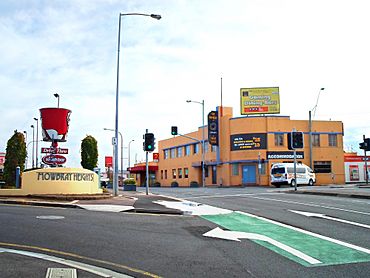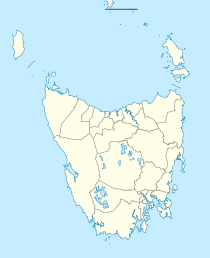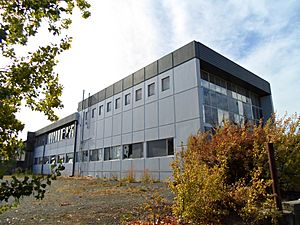Mowbray, Tasmania facts for kids
Quick facts for kids MowbrayLaunceston, Tasmania |
|||||||||||||||
|---|---|---|---|---|---|---|---|---|---|---|---|---|---|---|---|

Mowbray Hotel on the corner of Vermont Road and Invermay Road
|
|||||||||||||||
| Postcode(s) | 7248 | ||||||||||||||
| Area | 4.5 km2 (1.7 sq mi) | ||||||||||||||
| Location | 3 km (2 mi) from Launceston | ||||||||||||||
| LGA(s) | City of Launceston | ||||||||||||||
| State electorate(s) | Bass | ||||||||||||||
| Federal Division(s) | Bass | ||||||||||||||
|
|||||||||||||||
Mowbray is a suburb located near Launceston in the Australian state of Tasmania. It's well-known as the home of the Mowbray Racecourse, where exciting events like the Launceston Cup are held.
Mowbray also includes two smaller areas: Mowbray Heights and Vermont. The suburb sits on a flat area called Mowbray Hill. This hill is about 28 meters (around 92 feet) above the Tamar River and its flood plains.
What's in a Name?
The name "Mowbray" comes from an old homestead property. This property used to be located where the Launceston Church Grammar School is today. It was named and owned by a person called Martin Mowbray Stephenson.
The Mowbray Racecourse was a big part of this property. Horse races have been held there for a very long time, starting as early as 1830. The name "Mowbray" itself has roots in Normandy in France. It literally means "mud hill."
How Mowbray Grew
Mowbray didn't start to become a suburb until the late 1800s. At that time, a small group of streets was planned. These streets were built on the southern slopes of Mowbray Hill. They were located on the eastern side of Invermay Road and Button Street, stretching towards the Launceston Church Grammar School.
After World War I, even more streets were added. These new streets were built north of Button Street and Vermont Road. They formed a rough grid that spread north towards Newnham. They also went east towards the racecourse and west towards the edge of the hill, where it drops down to the Tamar River. Many of these streets were named after important allied soldiers and commanders from the war, such as Haig Street.
 | Delilah Pierce |
 | Gordon Parks |
 | Augusta Savage |
 | Charles Ethan Porter |



